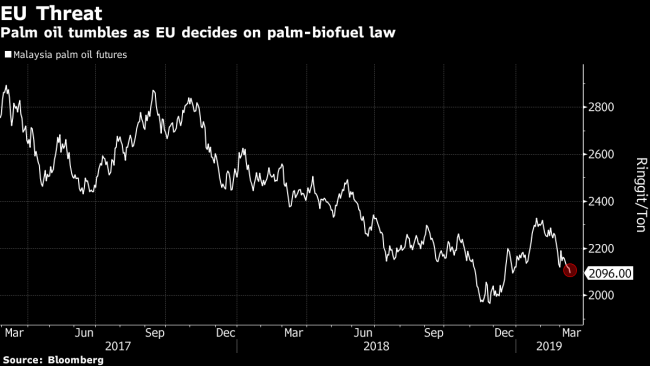(Bloomberg) -- The European Union set new criteria for the use of palm oil in biofuels in a balancing act to avert a trade war with producers in Asia while appeasing climate protagonists at home.
The measure approved by the European Commission on Wednesday spells out the type of biofuels from palm oil that may be counted toward the EU’s renewable-energy goals and introduces a certification system, according to an EU official with knowledge of the matter. It is a follow-up to a broader law agreed on by the 28-nation bloc last year, when the European Parliament pushed for restrictions on the use of palm oil on concerns its production caused deforestation and aggravated climate change.
Indonesia and Malaysia, which together account for 85 percent of global supply, have warned that they are ready to retaliate against “discriminatory” measures to curb palm oil shipments. Palm oil prices have dropped 15 percent since the start of 2018 amid the EU environmental campaign.
The EU wants to lead the battle against global warming and has stepped up efforts to reduce greenhouse gases blamed for climate change. It aims to cut emissions by at least 40 percent by 2030 compared with 1990 levels, boost the share of renewable energy to 32 percent and increase energy efficiency by 32.5 percent.
The EU Parliament’s campaign to limit the use of the vegetable oil in renewable fuels polarized member states and was supported by environmental lobbies, which have argued that the EU should end public support for high-emission biodiesel from palm oil, rapeseed and soy. Forty-six percent of total palm-oil imports into the bloc are used for biofuels, according to the EU assembly.
The details of the EU regulation will be revealed later Wednesday. A draft published last month for input by governments, experts, businesses and non-governmental organizations classified palm oil as “unsustainable” but at the same time envisaged a number of exemptions. That would mean Europe can keep the use of palm oil in diesel at current levels, according to green lobby Transport & Environment.
The EU renewable energy law that obliged the commission to set sustainability criteria for palm oil under its green goals specifies that the use of unsustainable food and feed crop-based biofuels should be limited from 2019, with a view to start a gradual phase-out in 2023 leading to a ban by 2030.
The law also called on the EU regulatory arm to develop a certification system for biofuels linked to their impact on so-called indirect land-use change, or a phenomenon where crop-based biofuels displace food production or lead to deforestation, indirectly boosting greenhouse-gas emissions.
The biggest palm oil producers stepped up lobbying in Brussels to defend its future in the European market. The Council of Palm Oil Producing Countries, whose members Indonesia, Malaysia and Colombia produce about 90 percent of global supply, announced they will jointly challenge the bill through bilateral consultations, as well as through the World Trade Organization. The council said the law uses a “scientifically flawed” concept that targets palm oil and “makes no attempt to include broader environmental concerns” linked to other vegetable oils.
Malaysia plans to halt all expansion of oil palm plantations as it seeks to dispel the oil’s reputation as a driver of deforestation, Minister of Primary Industries Teresa Kok said in an interview earlier this month. The EU accounted for 12 percent of Malaysia’s palm oil exports in 2018, making it the biggest buyer after India, according to the Malaysian Palm Oil Board.
Indonesia has warned that the EU restrictions on the use of palm oil would jeopardize the nation’s fight against poverty. The country’s special envoy on palm oil has said that Indonesia and the EU need to find a “win-win” solution, adding that his country considered buying around 250 new airplanes, with Airbus among possible suppliers.
